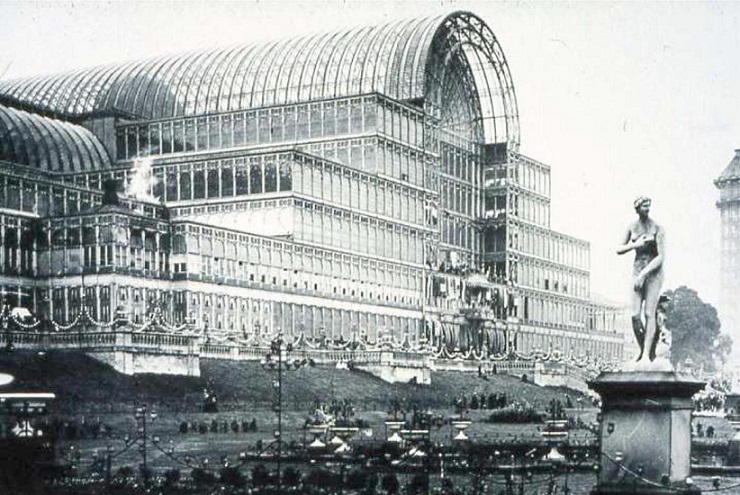
Reflective glory: The Crystal Palace at its 1930's peak
The 1930s is widely acknowledged to be a golden period of composition for the brass band movement - the stimulus provided by Holst’s ‘Moorside Suite’ (1928) leading to the flowering of Elgar’s ‘Severn Suite’ (1930), John Ireland’s ‘Downland Suite’ (1932) and ‘Pageantry’ (1934) by Herbert Howells.
However, as Paul Hindmarsh identified in his insightful analysis for Trevor Herbert’s seminal book, ‘The British Brass Band’ (2000) - this impressive ‘First Harvest’ never quite materialised into a hoped-for annual bounty of lasting artistic significance.
His was an endorsement of a view first aired in 1936 by John F. Russell and J. H. Elliott in an equally seminal publication – ‘The Brass Band Movement’.
Alongside Denis Wright’s ‘Scoring for Brass Band’ (1932) and Harold Hind’s technical treatise ‘The Brass Band’ (1934), it too formed the first significant literary harvest for the movement (noting earlier publications such as Algernon Rose’s ‘Talks with Bandsmen’ (1895) - although one that was also to wither on the publisher’s vine.
Missionary work
A few years earlier Elliot had seen Holst conduct ‘Moorside Suite’ in rehearsal and offered his opinion that the ‘brass band movement had a great future before it’. The composer rather tersely responded by saying: “It has a great present – if only people would realise it.”
It is one of many, almost eternal observations made in Russell & Elliot’s pioneering analytical history of a movement that at the time was approaching its centenary, and which are as relevant today as they were when the book was first published.
Elliot subsequently noted that his death in 1934 “prevented some ambitious ‘missionary’ schemes from maturing”.
It is one of many, almost eternal observations made in Russell & Elliot’s pioneering analytical history of a movement that at the time was approaching its centenary, and which are as relevant today as they were when the book was first published.
Not a great deal is now known of them (historian David Russell called Elliot ‘an informed insider’), yet it is obvious that they write with insight and rigour (despite the limited research resources that had at the time). It’s a compact journalistic style; clear and informed.
Origin and history
In their foreword the authors state that it “represents the first attempt to bring together some of the widely scattered material relating to its origin and history” – a collaboration which they hoped would “help to remove some of the misapprehensions that have grown up in relation to the movement”.
The volume is in fact two books in one – the first by Russell exploring the early history of the movement - from instrumental development to the emergence of the brass band contest.
Meanwhile Elliot examines the ‘modern brass band’ – which he sees as gaining lasting impetus by 1860.
In their foreword the authors state that it “represents the first attempt to bring together some of the widely scattered material relating to its origin and history” – a collaboration which they hoped would “help to remove some of the misapprehensions that have grown up in relation to the movement”.
Russell is at his best when looking at the early contest years from 1845-1860 – which he said soon produced “a brass band ‘atmosphere’ not incomparable with the football craze of today”.
Elliot too captures the good and bad of the ‘modern movement’ – the chapter on ‘Evils and their Cure’ a litany of dissent, accusation and ‘disgraceful scenes’. You cannot help but chuckle though at a report from 1910 that saw the announcement of the results met with an impromptu rendition of the ‘Dead March’ from ‘Saul’ from some disgruntled competitors.
Relevance
Hard backed originals are now rare (4BR’s well-thumbed and annotated copy bought on-line was once the ‘Property of Manchester Public Libraries’ – and last taken out in April 2009) – although there is a digital version easily accessed via the University of Rochester amongst others.
The final paragraph of the book reads: “The brass band movement has developed, and is developing, solely on its inner resources. That it has already risen so high is more than remarkable – it is miraculous.”
Like Elgar’s ‘Severn Suite’ – the first page of which is printed in the foreword, it is a work that has lost none of its relevance by the passing of time.
The final paragraph of the book reads: “The brass band movement has developed, and is developing, solely on its inner resources. That it has already risen so high is more than remarkable – it is miraculous.”
It is an honest conclusion that could have been written in 2023 let alone 1936.
Iwan Fox









